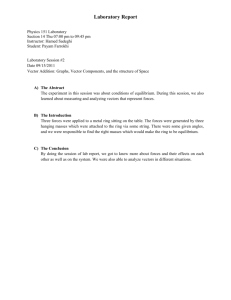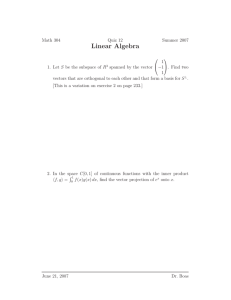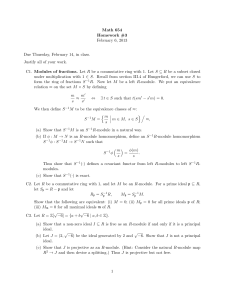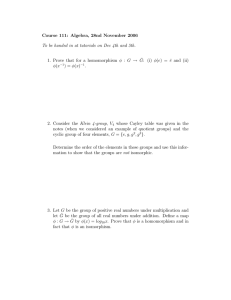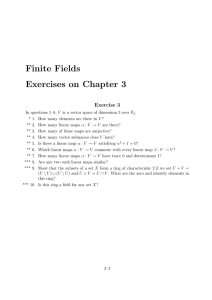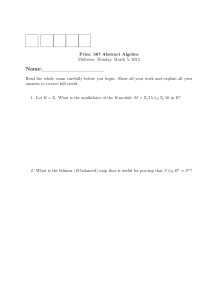Checklist for the final exam Renzo’s Math 281 December 12, 2008
advertisement
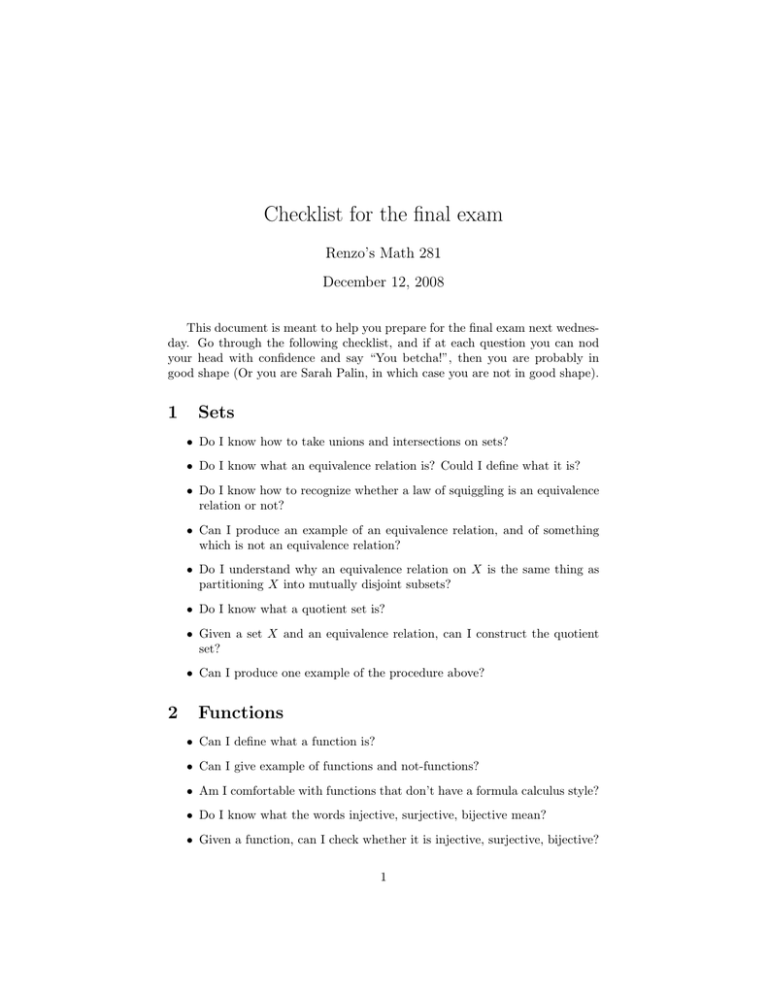
Checklist for the final exam Renzo’s Math 281 December 12, 2008 This document is meant to help you prepare for the final exam next wednesday. Go through the following checklist, and if at each question you can nod your head with confidence and say “You betcha!”, then you are probably in good shape (Or you are Sarah Palin, in which case you are not in good shape). 1 Sets • Do I know how to take unions and intersections on sets? • Do I know what an equivalence relation is? Could I define what it is? • Do I know how to recognize whether a law of squiggling is an equivalence relation or not? • Can I produce an example of an equivalence relation, and of something which is not an equivalence relation? • Do I understand why an equivalence relation on X is the same thing as partitioning X into mutually disjoint subsets? • Do I know what a quotient set is? • Given a set X and an equivalence relation, can I construct the quotient set? • Can I produce one example of the procedure above? 2 Functions • Can I define what a function is? • Can I give example of functions and not-functions? • Am I comfortable with functions that don’t have a formula calculus style? • Do I know what the words injective, surjective, bijective mean? • Given a function, can I check whether it is injective, surjective, bijective? 1 • Do I understand the concept of composition of functions? • Do I know what the identity function is? • Do I know what an inverse function is? • Do I know how to characterize bijective functions in terms of existence of an inverse function? 3 Groups • Can I define what a group is? • Do I know what the identity element is? (I.e. what are the properties that make an element the identity!) • Can I recognize if a set with an operation is a group or not? • Can I use comfortably additive notation, multiplicative notation, or any smiley I want to describe the operation in a group? • Do I have a good library of “familiar groups” to play with? • In particular, am I familiar with Z/nZ and Sd ? • Do I know what a subgroup is? • Given some elements in a group, can I find the subgroup generated by those elements? • Do I know what a quotient group is? • Given a group G (with a commutative operation) and a subgroup H, can I find the quotient group? • Do I know what a group homomorphism is? • Do I know how to recognize a group homomorphism? • Do I have a few examples of things that are and are not group homomorphisms? • Do I know what the kernel of a group homomorphism is? • Given only partial information about a group homomorphism, can I complete the picture using the properties of a homomorphism? • Do I know what a group isomorphism is? 2 4 Rings and Fields • Can I define what a ring/field is? • Do I know what the identity elements are? (I.e. what are the properties that make an element the identity!) • Do I know how the additive identity (0) behaves under multiplication? Could I prove this? • Can I recognize if a set with two operations is a ring/field or not? • Do I have a good library of “familiar rings/fields” to play with? • In particular, am I familiar with the rings of matrices and of polynomials? • Do I know that Z/nZ is a ring? Do I know for what values of n it is a field? • Do I know what a subring is? But more importantly, do I know what an ideal is? • Do I know what a quotient ring is? • Given a ring R(with commutative multiplication) and an ideal I, can I find the quotient ring? • Do I know what a ring homomorphism is? • Do I know how to recognize a ring homomorphism? • Do I have a few examples of things that are and are not ring homomorphisms? • Given only partial information about a ring homomorphism, can I complete the picture using the properties of a homomorphism? • Do I know what a ring isomorphism is? 5 Linear Algebra • Do I know what a vector space is? Can I define it? • Do I have a few examples of vector spaces? • Do I know what a vector subspace is? • Can I check whether a subset of a vector space is a subspace or not? • Is the idea of linear combinations of vectors clearly impressed in my mind? 3 • Given some vectors, can I construct the vector subspace generated by such vectors? • Do I understand linear independence? • Given a set of vectors, can I check if they are linearly independent? • Do I know how to define the notion of a basis for a vector space? • Given a set of vectors, can I check whether they form a basis for my vector space? • Do I know how to define the dimension of a vector space? • Do I know what a linear function is? • Can I recognize whether a function is a linear function? • Is it clear that if I know the values of a linear function on some vectors, then I know the values of the function on all of the vector subspace generated by such vectors? • And therefore that if I know the values of a linear function on a basis, then I know it everywhere? • If Renzo gives me the values of a linear function on a basis, and then asks for the value of it on a given vector, can I do that? • Do I know what the kernel and the image of a linear function are? • Could I prove that kernel and image are vector subspaces? • Am I familiar with the theorem about dimension of kernel plus dimension of image etc etc? Do I know how to apply it? 6 Symmetric Functions • Do I know what a symmetric polynomial is and do I know how to recognize it? • Do I know what elementary symmetric polynomials are, and how they relate roots and coefficients of polynomials? 7 Miscellaneous • Can I do an elementary proof? (e.g. like those you had to choose from on the second midterm) • Can I do a proof by induction? • Can I do a proof by contradiction? 4
